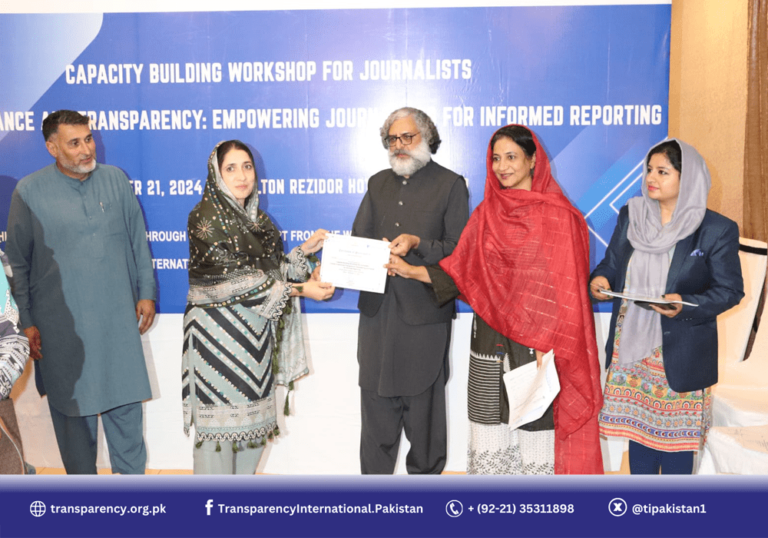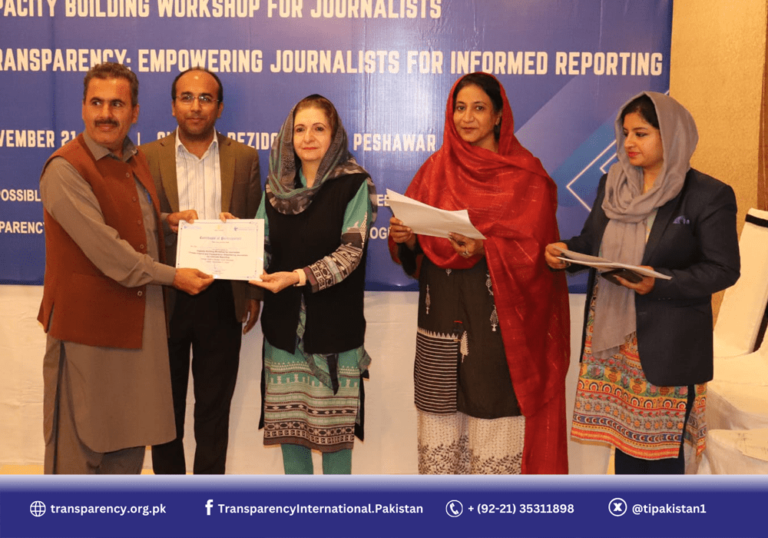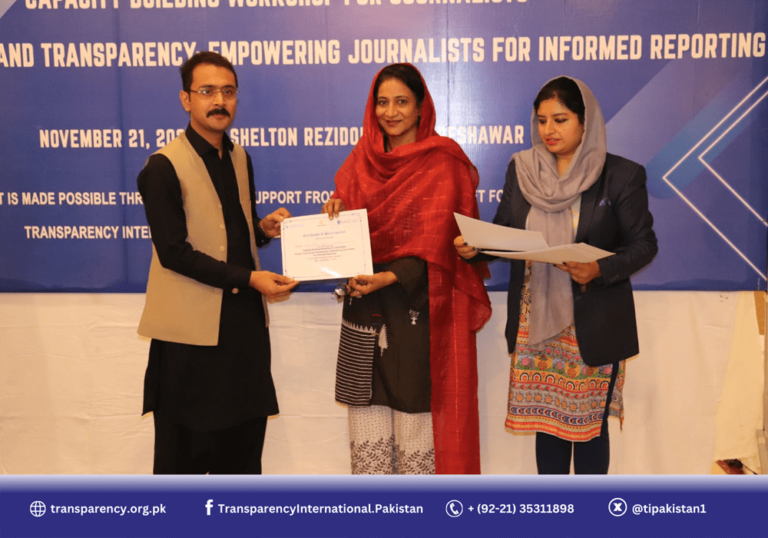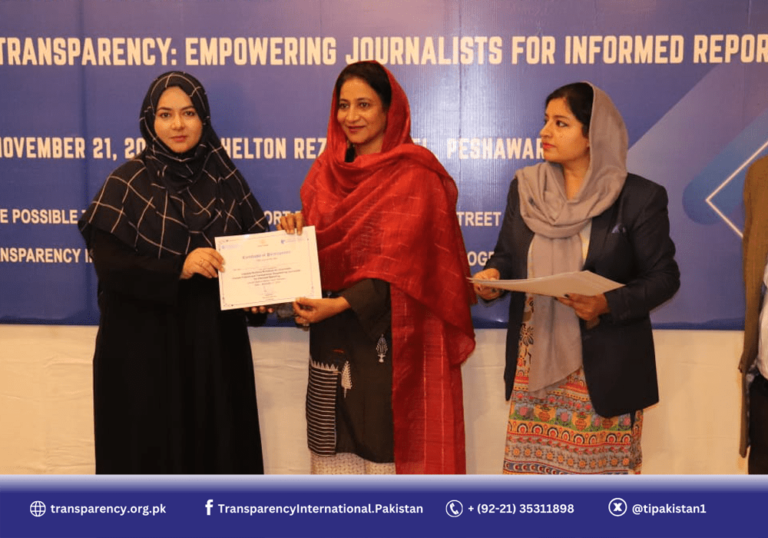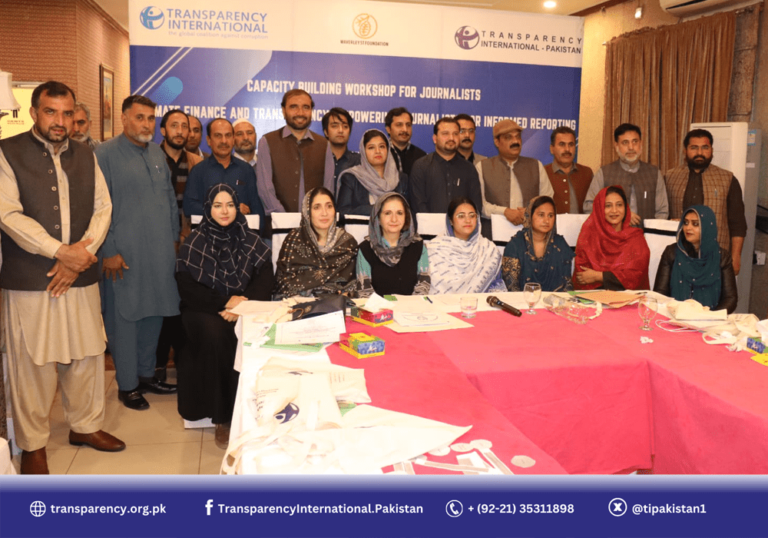Capacity Building Workshop for Journalists - Climate Finance and Transparency: Empowering Journalists for Informed Reporting
Capacity Building Workshop for Journalists – Climate Finance and Transparency: Empowering Journalists for Informed Reporting
Venue: Shelton Rezidor Hotel, Peshawar
Date: Thursday, November 21, 2024
Transparency International Pakistan organized a one-day Capacity Building Workshop for Journalists on “Climate Finance and Transparency: Empowering Journalists for Informed Reporting” on Thursday, November 21, 2024, at Shelton Rezidor Hotel, Peshawar, Khyber Pakhtunkhwa Province.
The workshop brought together 34 journalists, including 10 women, from 17 climate-vulnerable districts across the Khyber Pakhtunkhwa Province. The workshop aimed to equip journalists with knowledge on climate finance mechanisms and policies, promote transparency in climate action and strengthen reporting skills for more informed public dialogue, particularly in Khyber Pakhtunkhwa Province.
The session began with a Quranic recitation. Ms. Nasreen Memon, Project Coordinator, TI Pakistan welcomed the participants. She outlined the objectives of the workshop, emphasizing its goal to equip journalists with the essential knowledge and tools for effective reporting on climate finance and transparency, and drive accountability in climate action.
Afterwards, Mr. Badar Alam, senior journalist and CEO of PRIED, led a session on “Climate Change Terminology and Framing,” explaining terms like greenhouse gases, carbon neutrality, and climate resilience. He discussed the severe effects of climate change on agriculture and livelihoods in Khyber Pakhtunkhwa (KPK), including food insecurity, 2022 floods, and 2023 disasters like droughts and glacier collapses. He informed that Pakistan is making progress on its climate goals, including increasing solar energy capacity and saving 1,200 MW through energy efficiency. The country has invested $2 billion in climate-resilient infrastructure, protecting 1 million people from floods, and trained 200,000 farmers in sustainable agriculture, boosting crop yields by 15%.
Dr. Shakeel Khan, lecturer, University of Peshawar, discussed the climate vulnerabilities of Khyber Pakhtunkhwa (KPK), highlighting climate challenges in the region. He emphasized weak climate governance due to poor enforcement, limited expertise, inadequate resources, and low public engagement, which hinder effective policy implementation and progress. He said that while the Khyber Pakhtunkhwa Climate Change Policy 2022 provides a district-wise vulnerability map and addresses climate challenges based on each district’s vulnerabilities, he stressed that more needs to be done. He emphasized the need for strengthening institutional frameworks, improving resource allocation, enhancing public awareness, and ensuring the active participation of local communities to tackle climate change more effectively.
Moving on, Ms. Nasreen Memon presented the overview of Khyber Pakhtunkhwa (KP) Climate Change Policy 2022, emphasizing priorities for effective implementation. She highlighted that key policy objectives include reducing GHG emissions, enhancing resilience, and protecting biodiversity, with a focus on renewable energy, and climate-resilient farming. A task force will oversee implementation, conduct risk assessments, and ensure accurate reporting to improve future climate responses. She emphasized that journalists should accurately report on climate policy objectives, while monitoring implementation and holding stakeholders accountable. They also play a crucial role in combating misinformation to ensure informed public understanding.
She highlighted that the policy also emphasizes gender inclusion and acknowledges the critical role of women in addressing climate challenges. Specific measures are directed toward creating livelihood opportunities for women to enhance their resilience and socio-economic well-being. Through storytelling and reporting, journalists can inspire community engagement and hold stakeholders accountable for promoting gender equity in climate initiatives.
In the following session on “Understanding Climate Finance and Transparency”, Mr. Kashif Ali, Executive Director, Transparency International Pakistan, highlighted critical aspects of climate governance and finance. He highlighted that Pakistan has received only 10% of the pledged funds post-2022 floods, relying heavily on international mechanisms like the Green Climate Fund. Domestic climate expenditure remains limited, falling short of the estimated $348 billion needed by 2030. He said that the annual climate meeting COP29 outcomes include the establishment of a $300 billion annual climate finance goal, New Collective Quantified Goal (NCQG) for climate finance and a push for integrating loss and damage into funding mechanisms. Pakistan advocated for simpler access to funds, prioritization of adaptation financing, and the urgent operationalization of the Loss and Damage Fund.
Mr. Kashif emphasized the need for improved public finance management, green budgeting, and results-based monitoring. He explained that journalists may report discrepancies between pledged and received climate funds, highlighting the impact on communities’ post-disasters. They can also explore how Pakistan’s domestic initiatives align with international commitments and feature case studies of affected regions.
Afterwards, Mr. Badar Alam discussed “Data-Driven Reporting on Climate Action to Influence Policy and Promote Accountability,” focusing on its relevance to Khyber Pakhtunkhwa. He explained that data-driven reporting on climate action involves using scientific data, statistics, and real-world evidence to provide accurate insights into climate change impacts, policy effectiveness, and environmental outcomes in the region. Journalists in KP play a crucial role in analyzing and presenting this data in the local context to inform the public and hold policymakers accountable. He also pointed out that obstacles like inadequate resources, insufficient training, and political pressures often hinder comprehensive climate journalism in Pakistan, affecting the region’s climate discourse.
Next, participants engaged in a group activity. They were divided into groups each guided and mentored by one of the speakers. They were tasked with applying the knowledge and insights gained from the workshop to identify effective mitigation and adaptation strategies, as well as various types of climate finance.
Afterwards, Ms. Farah Hamid Khan, Chief Information Commissioner, KP Information Commission, discussed right to information and climate justice. She emphasized that The Khyber Pakhtunkhwa Right to Information Act, 2013 is a powerful tool that enables journalists to access verified climate-related information for investigative reporting. This ensures transparency in government actions and the use of public funds. She highlighted how the RTI Act helps uncover misuse of funds and irregularities, promoting transparency and self-accountability. She emphasized that RTI for climate justice ensures equitable climate action. She stressed that climate justice protects vulnerable communities, ensures fair distribution of climate impacts, and empowers marginalized groups in policymaking.
Moving on, Mr. Kashif Ali delivered a session on “State of Data Disclosure of Climate Change Khyber Pakhtunkhwa”. He highlighted that TI Pakistan’s recent report assesses the proactive disclosure practices by 13 departments across the province as mandated under Access to Information laws. The report reveals that nearly half of the departments have scored below 50%, with compliance on clauses requiring budget and expenditure information standing at just 33%.
Mr. Kashif urged journalists to scrutinize the availability and quality of climate-related data from government departments and non-governmental sources. To address the governance challenges in KP, he also proposed several measures, including the development of centralized information portals, capacity building for government staff, timely publication of reports, and improved inter-departmental coordination.
Towards the end, Ms. Nasreen Memon expressed her gratitude to the participants for their active involvement and engagement. She then proceeded with the certification ceremony, recognizing the attendees’ contributions and efforts.













